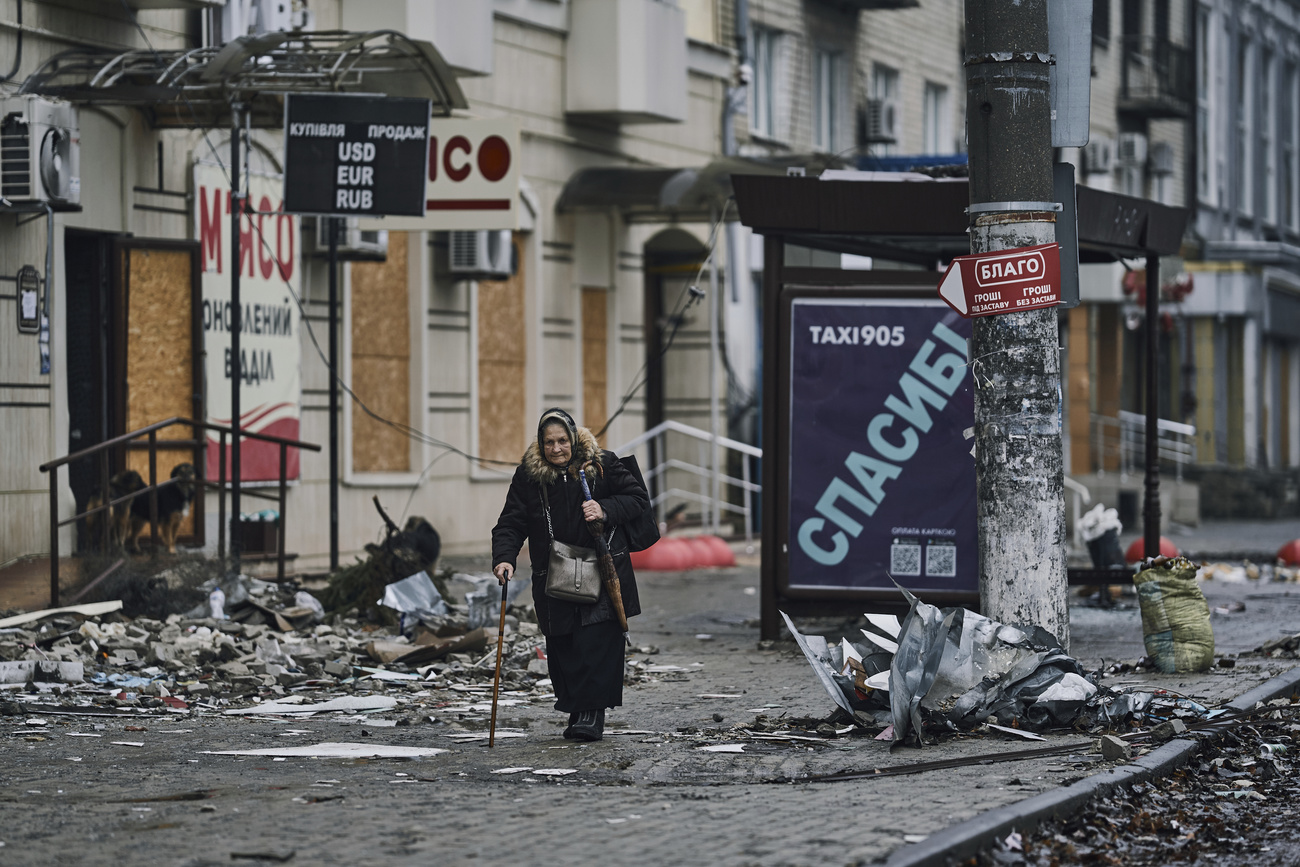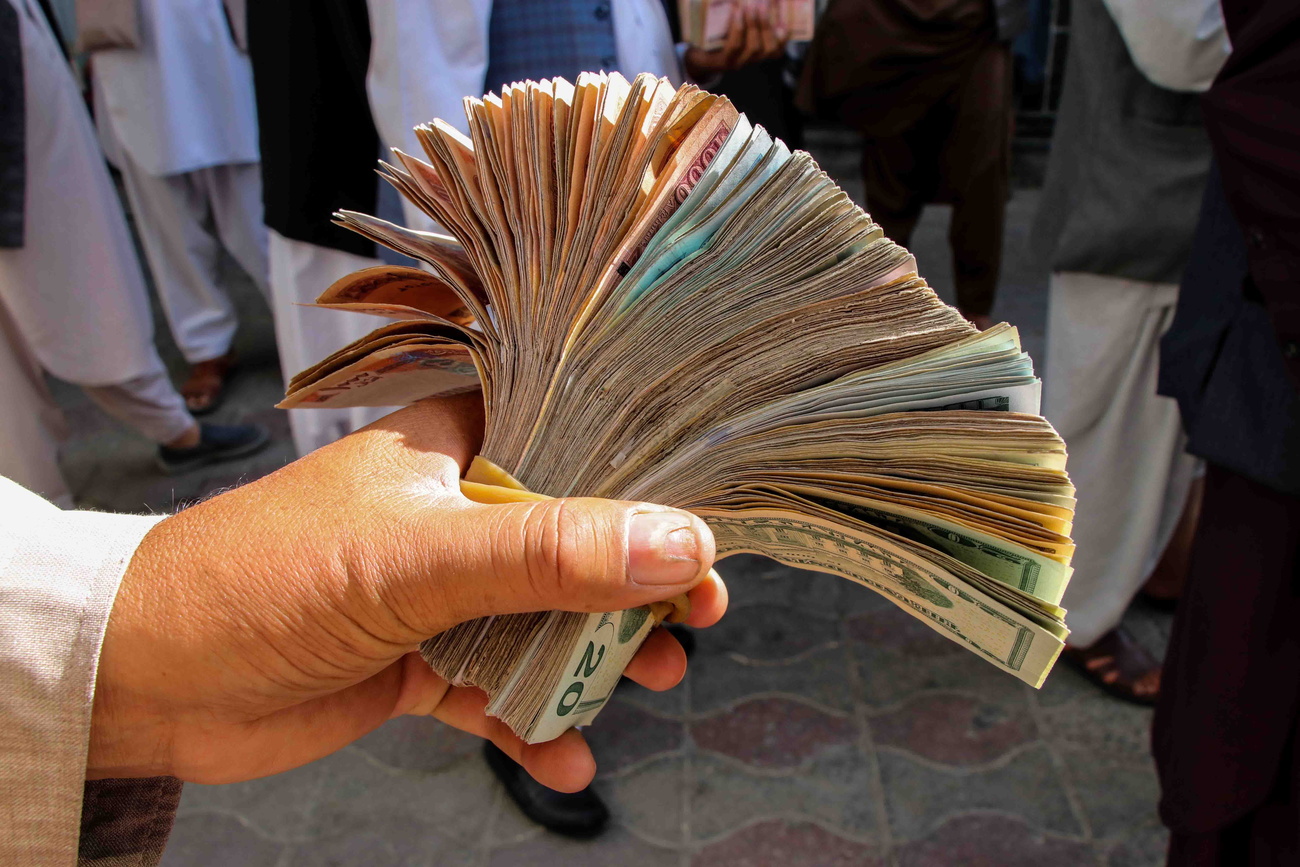
Could Switzerland seize Russia’s foreign reserves for Ukraine reconstruction?

Talks are intensifying in Europe over the possibility of seizing the frozen assets of the Russian central bank to pay for rebuilding work in Ukraine. States, including Switzerland, are wading through a host of legal issues over the feasibility of this controversial idea.
The president of the European Council, Charles Michel, is pushing EU member states to seriously consider transferring Russian central bank assets frozen since the start of the invasion to a fund, where they can be managed to generate profits. These returns could then be used for reconstruction in Ukraine.
“It is a question of justice and fairness,” Michel told the Financial Times. “It must be done in line with legal principles – this is very clear.”
To reassure states – some of whom question not only the legal basis for seizing a foreign country’s money but also the potential risks to financial stability – EU officials have vowed any action would be taken together with allies.
These allies include Switzerland. While in recent days a working group concluded that expropriating private assets of lawful origin would be illegal, the option of seizing Russia’s frozen reserves and other state assets remains a point of international discussion, which the government says it’s closely following.
Why are states interested in Russia’s central bank assets?
Ukraine has been urging countries that imposed sanctions on Russia to transfer any frozen assets to Kyiv so they can be used for reconstruction. While much of the focus had been on seizing the assets of Russian oligarchs – Switzerland has frozen about CHF7.5 billion ($8 billion) of these funds – now attention has turned to another pot: the roughly $300 billion (CHF275 billion) of Russian foreign-exchange reserves held in overseas accounts that were frozen soon after the war began.

More
Switzerland says sorry! Oligarchs’ paradise
These assets could go a long way to paying for rebuilding work, which Ukrainian Prime Minister Denys Shmyhal estimated last autumn could cost $750 billion.
The EU, however, is still taking stock of exactly how much money has been frozen on its territory. One estimate hovers around €33 billion (CHF32.5 billion).
Can states legally seize assets that have been frozen on their soil?
In the EU and Switzerland, no law currently exists that would allow authorities to seize frozen Russian assets.
Switzerland could introduce a federal law giving it the power to do this, says Peter V. Kunz, director of the Institute for Economic Law at the University of Bern. But any proposed text may first need the approval of Swiss voters, he warns.
In the EU, setting down the legal grounds should be relatively simple, according to Matthias Goldmann, a professor of international law at EBS University in Wiesbaden, Germany. The 27-member bloc could, for example, create a trusteeship to manage the seized funds as part of its supranational competence to adopt sanctions-related measures – or on the basis of an international agreement, which would be the more likely scenario.
The major sticking point is whether seizing the money is legal under international law, Goldmann says, as central bank reserves enjoy state immunity from execution. This means that assets cannot be seized if they are earmarked for public use.
“Is [taking the money] violating the immunities of Russia? It’s not clear whether the central bank funds of a government that has engaged in a serious violation, like a war of aggression, would still enjoy immunity,” he says.
If states decide that Russia is still entitled to immunity, then they would first need its consent to seize its reserves. Moscow, though, has already said it would fight any attempt to confiscate its funds.
Has something like this been done before?
Most cases of seizing foreign reserves have happened in connection with enforcing the sovereign debt, according to Goldmann.
A more pertinent case occurred last year, when a US court allowed authorities to move half of the reserves of the Afghan central bank frozen in New York – roughly $3.5 billion – to a trust fund in Geneva. The trust intends to disburse some of that money to benefit the people of Afghanistan, who have faced worsening humanitarian conditions since the return of the Taliban in August 2021.

More
How a portion of Afghanistan’s foreign reserves ended up in Geneva
That decision – together with the ongoing discussion about the Russian funds – could be seen as a sign that a customary law rule is emerging to consider exemptions from immunity in cases of serious rights violations, Goldmann says.
What about risks to international financial stability?
Some states have suggested that seizing Russian assets could cause central banks to decide it’s too risky to hold their money abroad. Goldmann does not exclude this possibility.
“It could be that, as a consequence, some central banks try to bring their gold home,” he says. “It depends on the risk profile of the home country and the circumstances. But it wouldn’t be an impediment to international commerce if this homeshoring happened.”
Russia itself would likely want to save any foreign reserves it has left.
“They have some accounts that nobody knows about, so they will definitely try to bring that home,” he says. “But for a bank like Russia’s, it will always be important to have some reserves abroad because you never know what might happen to the domestic currency.”
How likely is it that Switzerland will actually seize Russia’s frozen assets?
For Kunz at the University of Bern, it seems unthinkable that neutral Switzerland would seize the Russian reserves.
“Confiscation would be a radical change from the current situation [with the country’s position on neutrality],” he says. “It would be acceptable only if not only the US, the EU and others seize the assets, but there are also UN sanctions in this regard.” The latter is highly unlikely, he adds, given Russia’s veto on the United Nations Security Council.
Kunz is also sceptical that Swiss voters would support the idea of seizing the assets.
For now, officials are staying vague about their intentions. Ingrid Ryser, a spokesperson for the department of justice, told SWI swissinfo.ch that Switzerland “is prepared to work towards an internationally coordinated process to find solutions that will enable reparation for the damage caused and the reconstruction of Ukraine, while respecting the principles of the rule of law”. Asked if the country would help the EU set up a fund for Russian reserves, Ryser declined to comment.
Goldmann, though, believes that states should confiscate the assets, if only to have a bargaining chip in any future peace negotiation.
“If Ukraine has some negotiating potential, then it will claim some damages,” he says. “And then these frozen assets will come into play.”
Edited by Marc Leutenegger

In compliance with the JTI standards
More: SWI swissinfo.ch certified by the Journalism Trust Initiative






























You can find an overview of ongoing debates with our journalists here . Please join us!
If you want to start a conversation about a topic raised in this article or want to report factual errors, email us at english@swissinfo.ch.